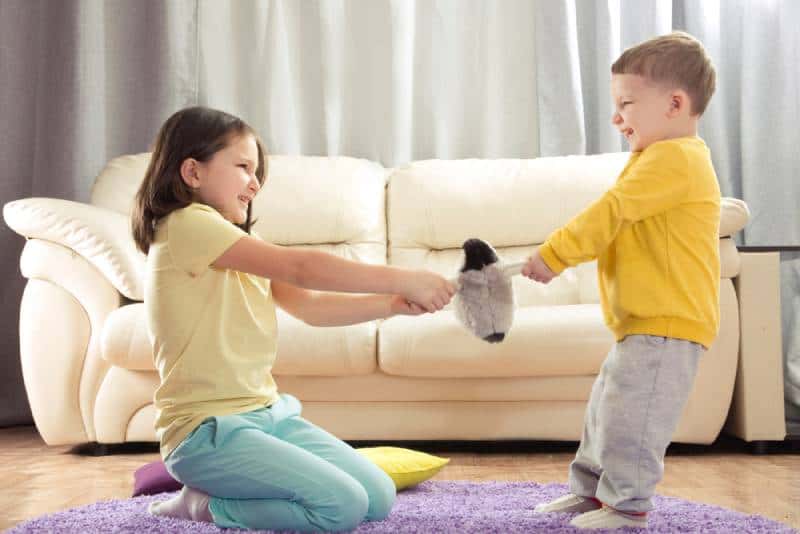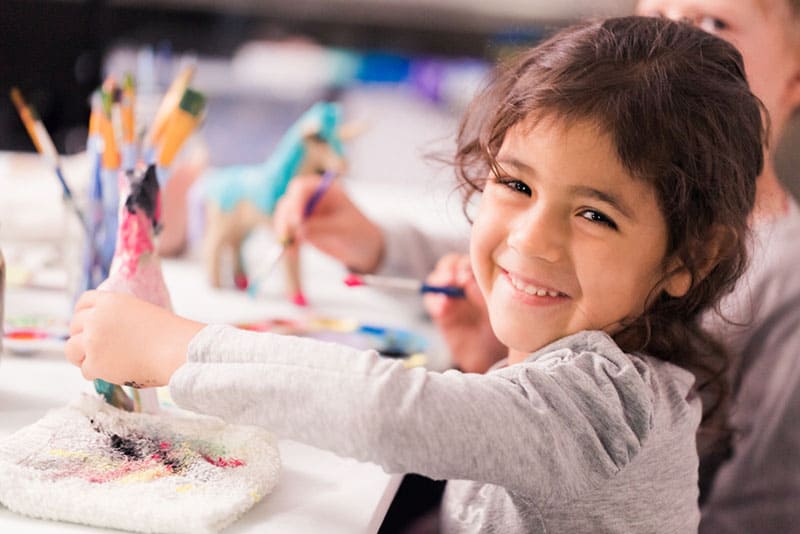When it comes to praising children, many of us think that it does nothing but benefit the child’s self-esteem and boost his morale, but the truth is that there are many more layers to this than meets the eye.
Praising children can be a double-edged sword where too little may leave the child feeling unnoticed or unloved while too much praise may come off as insincere or even make young children become too full of themselves.
That’s why it’s important to strike a proper balance by figuring out exactly when it’s right to praise your child and when to avoid it.
In fact, controlling praise plays a major role in proper mental development for young children and, if done properly can do wonders for them.
They develop a growth mindset as their self-confidence, self-esteem, and self-worth aren’t stunted by insincere praise or fake gestures of satisfaction. This is why balanced praise is an important factor when it comes to raising children.
But most importantly, it helps boost their levels of intrinsic motivation so they can help motivate themselves without needing anyone else’s approval.
This allows them to better devote themselves to their crafts and hobbies.
Remember, all kids process praise differently so no two processes are going to work the same and the effects of praise vary greatly as you’ll see in some of the explanations below.
So, what is the right use of praise and how will you know what specific kind of praise you should incorporate with your own kids?
Well, we’re here to figure that out together.
9 Ways Of Approaching Praise Properly

1. Avoid generalizing
When it comes to praising children, parents’ praise goes much further than that of teachers or friends, but it’s very important to be specific about what you’re praising them for.
Using specific praise when congratulating them on a recent achievement will let them know exactly what it was that they did well and they’ll subconsciously aim to do the same thing again.
Plus, it feels a lot more sincere and shows that you were paying attention to what they were doing rather than just giving empty or throwaway comments.
When using praises that are too generalized, the desired effect turns out to be a lot weaker in most cases, and in some situations can even go in completely the opposite direction.
An example of one such phrase is: Well done.
A common phrase that is often used, but its simplicity and generic nature make it more of an off-handed comment than actual praise.
Sure, some kids may not notice it at first, but they’re a lot smarter than we give them credit for – believe me, they will catch on.
Once they do realize, they’ll start valuing your opinion less and less and even if your intentions are sincere, they’ll take them as fake, only serving to further lower your children’s self-esteem.
2. Sincerity is key

Speaking of sincerity, it is also one of the key factors when praising children and the best form of praise you can use(there are others, but more on them later).
When you start speaking from the heart and complimenting them on things that genuinely make you proud of your kids, you’ll automatically start filtering out some of the scenarios where it would’ve been a bit too much.
You’ll be well on your way to eliminating the hurtful and sometimes downright toxic type of praise that some parents consciously utilize to control their kids.
Trust me, there is nothing worse than someone using praise as a tool for control or as a way to off-handedly throw a comment on a small achievement.
I was on the receiving end of such behavior and even though my parent did it unconsciously, it really did a number on my self-esteem! It made me only want to do things that would please them to bring about this empty and hollow form of praise that would make me feel good.
Even though I wasn’t really feeling good for myself, but for them.
It’s a tough hole to get out of and luckily I’ve managed to do so by confronting the parent in question and making them realize just how impactful words and their phrasing can be when they’re coming from someone important in your life.
It’s one of the rare instances where the saying, “Sticks and stones may break my bones, but words can never hurt me” doesn’t hold true.
So please, even if you think you’re doing a good job in properly selecting the moments of praise and in what you’re saying in those moments, sit down when you have the time and re-evaluate if it’s genuinely sincere or not.
Even better would be to ask your child if your praises have ever felt insincere to him.
One such example of insincere praise would be: Wow, you’re a natural-born prodigy! for a child who simply got an A in a subject after getting a string of C’s or such. The compliment tends to feel too insincere and thus loses its value.
3. Stop overpraising your kids

One of the cardinal sins of praise is doing it too often.
Enough of a good thing is fine and all, but too much of a good thing simply dilutes its effect and makes it less impactful or downright empty and hurtful at times as mentioned before.
Or worse, you’ll help fuel a level of narcissism in them and that’s very unhealthy.
While we all put our children on high pedestals, making them think they’re better than all the other kids is not a healthy way of going about motivating your child.
He’ll never stop and realize if he’s made a mistake and might end up being too full of himself to even try, leading him down a dangerous road that’ll ultimately end in crashing and burning once reality hits again.
And it’s very hard to get out of that place once you get there, much like the previous point.
The best way of cutting back on how often you praise children of your own is to, once again, take some time to think about what exactly you’re praising them for and cutting down on praising them for everyday things. Things like cleaning their room, brushing their teeth, or going to bed on time.
All of these are examples of a child’s effort, but not all of them require constant praise to show that you’ve taken notice of it.
It’s just something that you expect to become the norm at some point.
Instead, praise good behavior over a set period of time, or when your kids do well in elementary school, or succeed in something new they’ve tried.
Times where they clearly put in the hours and the hard work that justifies these levels of praise.
Keep your praise for actual noteworthy successes that genuinely surprised you or the occasional times where you know your child needs a little bit of positive reinforcement to get his motivation and self-esteem back up.
Even then, you need to exercise caution so it doesn’t backfire and end up having the opposite effect.
4. Don’t compare your kids to others

If there’s anything that helps fuel narcissism or the feeling of low self-esteem and low self-worth it’s when you start comparing your kids to their peers.
This is most common between brothers and sisters where sibling jealousy often sparks.
A common example of that would be: Wow, you’re almost as good as your sister!
While somewhat praiseworthy, the comment comes off as hurtful. Even if it was the other way around, the other sibling would feel the same way. There are no winners.
Comparison is bad no matter how you look at it because you’re either making your child’s accomplishments seem less important than those of their school buddy or you’re elevating him to a level above the others which only serves to fuel his ego.
And there’s no specific age where this becomes an acceptable form of praise because a kid that is barely a two-year-old starts developing feelings of self-worth, never mind preschoolers and older kids.
So please, if your intent is to boost your children’s motivation levels, don’t do it by comparing them to the rest of the kids.
Do it by enticing them with new challenges and opportunities to help further develop their skills rather than breaking them down.
5. Stop trying to use praise as a tool for control

As I mentioned at the start, some parents, and people in general, try to use praise to help control the people they’re responsible for. In the parent’s case, that’s obviously their kids, but what exactly are they trying to do?
Well, they place a false idea in their kid’s mind that suggests certain courses of action will trigger praise. This leads kids down a path that the parent wants them to take rather than their own.
The kids think it’s their own idea when actually it was planted there. t. It’s a simple psychological trick, one that people often use when gaslighting others or manipulating them in general.
An example of this would be: You did great, I’m sure you’ll do even better next time.
This line here uses a little bit of positive reinforcement after being congratulated on doing a nice job to trick the child into doing the same thing again next time.
It may have been something the child didn’t particularly like doing, but by phrasing it in such a way, he’ll think it wasn’t that bad and the parent gets what they wanted out of it.
This method of controlling praise uses extrinsic motivation as a bad thing, a tool to push out the child’s intrinsic motivation so that they rely purely on the praise of others to get motivated enough to perform a task.
I’m certain that that’s not your intent when congratulating your child on a good performance, so next time, be a bit more aware of how you phrase your praises because they may be hampering positive child development.
6. Praise kids for the right things

As a former educator, it wasn’t uncommon for me to go about praising children in my class who had shown great improvement or who had managed to overcome a topic they were specifically struggling with.
But, I also made several mistakes at the start where I showered praise around like it was confetti at a birthday celebration, celebrating every single thing that the kids in my class did.
I was guilty of overpraise for a while, but that wasn’t the only problem. I didn’t know what I should focus my praise on.
I focused on praising the kids’ achievements instead of their efforts, which, while correct in a sense, wasn’t the right choice at the time.
Let me explain, there are two main things kids, and people in general, can be congratulated and praised for, effort and achievement.
When you praise the effort that your kids put into doing things, they start to focus on improving their grasp of a certain skill.
They seek to perfect themselves and put achievement off as a secondary drive so when they fail, they don’t quit right away but instead, they take the time to analyze their mistakes, see where they messed up, and determine what can be improved on.
It’s how you help develop a growth mindset in your kids, one that encourages perseverance, hard work, and self-improvement over the quick and short-lived satisfaction of a job well done.
It’s what helps build your kid’s intrinsic motivation.
A good example of effort-oriented praise is this one here: I really liked the way you approached this problem here.
It’s not the end result that gets praised, but rather the way the child got to the end result that earns the star.
On the other hand, praising kids for their achievements alone ends up giving them a lot more self-confidence, one that may end up backfiring ever so slightly when it comes to their ego, but it’s still very good in the right amounts.
Praising them based on their ability to perform will turn them into more results-oriented individuals and make for a mindset that supports that.
If your kid gets praised for being an exceptional athlete for instance, he’ll strive to keep that title by working harder for it as that will be the crux of his motivation.
This, while a good form of motivation, doesn’t help prepare your kids for failure and they’ll take it a lot harder should they meet an obstacle that they can’t overcome.
You’ll start seeing them avoiding new challenges and improvements in fields different from their respective ‘territory’ purely because they don’t want to feel as though there are others out there that are better than them at an activity.
An example of achievement-oriented praise is: You won! Congrats, you’re such an amazing athlete!
A bit of that comparison praise ends up pouring over into it simply because being praised on one’s ability and achievement almost always defaults to comparison.
Now, both styles are acceptable, but personally, I prefer the one that values a child’s efforts rather than being the best at something.
That’s because the child won’t have the added pressure of feeling as though they have to earn that praise by accomplishing the same results again in the future.
That said, whichever one you choose is completely fine, just make sure it’s the right one for your child.
7. Share in your child’s enthusiasm

There is no better way to praise a child than to share in their excitement once they accomplish something.
While more applicable to personal achievements, this step is just as important as any other on this list to make sure you praise your kids properly.
Personal goals are important for your kids, especially ones tied to their hobbies or their potential future vocations.
While you may not be fully invested in your kid’s line of work and may not know much about it, if he comes to you all giddy and excited that he has managed to master a new painting style or has finished off a chapter of his novel, share in the excitement.
You’ll have time to ask questions about it later or to try and get involved, but, in that moment, let him enjoy his time in the sun!
That said, it pays to be involved in what your child is doing so do make sure to at least know the basics of their dreams and hobbies so that it is clear you care enough to try and get involved.
8. Be creative with praising

While praise is most commonly associated with words alone, it doesn’t always have to be just that.
Simple gestures of acknowledgment or a present you buy or make yourself can work just as well, if not better.
Sure, you don’t want to spoil your child by showering him with gifts and leaving him expecting one every time he does something, but a bit of added effort here and there will be greatly appreciated.
Something as simple as a high-five or even a blue ribbon made out of paper and glue can make your child’s day, especially when it comes from you.
The key is to be spontaneous about it, to do it when he least expects it so it comes off as a surprise, which will then have a better and more positive effect on them.
That’s why it takes a keen eye to spot the most opportune moments to do so.
The most obvious one is when you see your child feeling down and you feel like some positive reinforcement is necessary to bring his spirits up.
The other one is paying attention to what they do. If you see them make their own bed without being asked to, take the trash out, or eat the veggies from their plate, commend them.
Nothing too major, something small, but still significant enough that will show them that you do care and that you still pay attention to what they do and how they grow and improve over time.
9. Knowing how to deliver praise in the first place

It’s not just about expressing words of praise when it comes to praising children or anyone for that matter, it’s how you deliver it.
And I don’t mean being creative. There is an actual form of etiquette for these things and they’re about the same as the advice you’d get given when going to a job interview.
There are a few key points to observe here.
The first is to maintain eye contact. Nothing sends a clearer message than talking eye-to-eye (if you can afford to crouch down for younger kids that is).
It makes the words you say a lot more personal and appear as though you’ve put a lot more effort into them than when you just say it in passing while focusing on something else.
And it’s not just the eyes, but the overall facial expression and tone of voice that matter as well.
Anything from a warm smile to full-blown euphoria is acceptable, but it’s up to you to gauge which is appropriate for which situation.
As for the vocal delivery, it depends on the context, use a pleasant and warm tone for the more personal levels of praise, but during a significant event where cheering your heart out is warranted, go for it!t
Just make sure to use a bit of common sense.
The words you use also play a big part in the delivery of praise. The language required evolves as your child grows older.
For instance, when you’re dealing with a newborn who can’t quite understand what they’re saying, a few endearing sounds here and there will do the trick whereas older kids require a more personal touch.
You have to read the room and know how to talk appropriately to kids of that specific age, but always make sure your words are meaningful and convey a certain level of empathy to show them that you care.
And lastly, focus on what they’re good at, their strengths.
This way you avoid the need for using comparative praise in its entirety and just get to go down a safer route, helping support healthy child development that isn’t to the detriment of others.
If they end up comparing themselves to others on their own, teach them that that’s not what matters in the end.
Everyone can be good in their own right and just because someone is better than them doesn’t mean that they aren’t good themselves.
The Bottom Line
Finding the right way of praising children can feel like walking on a tightrope with no safety net underneath you to catch you should you mess up.
One must find the right balance between the levels of praise needed to cross it safely and that requires attentiveness, empathy, sincerity, and a little bit of common sense to pull off efficiently.
If you don’t give your kids enough praise, they’ll end up thinking they didn’t do enough noteworthy things and their self-esteem and self-confidence will end up tanking severely.
On the other hand, if you end up overpraising your kids, they can grow up to be self-important and narcissistic individuals or people who become praise junkies, ones who’ll do anything just to fish for a compliment or acknowledgment.
You’re allowed a few mistakes here and there, nobody is perfect, but make sure to catch them early so you don’t end up having any of these scenarios.
Take note that learning how to praise kids is one of the staples of modern parenting as well, so let that be your motivation to work on it.
I have full confidence that you’ll make the right decision when it comes to your own kids though, just make sure to take it slow and everything will turn out just fine.
Like this post? Please share or pin it for later. You can also stay in the loop and follow us on Facebook, Instagram or Pinterest.

This post contains affiliate links. Please see our full disclosure for more info.

